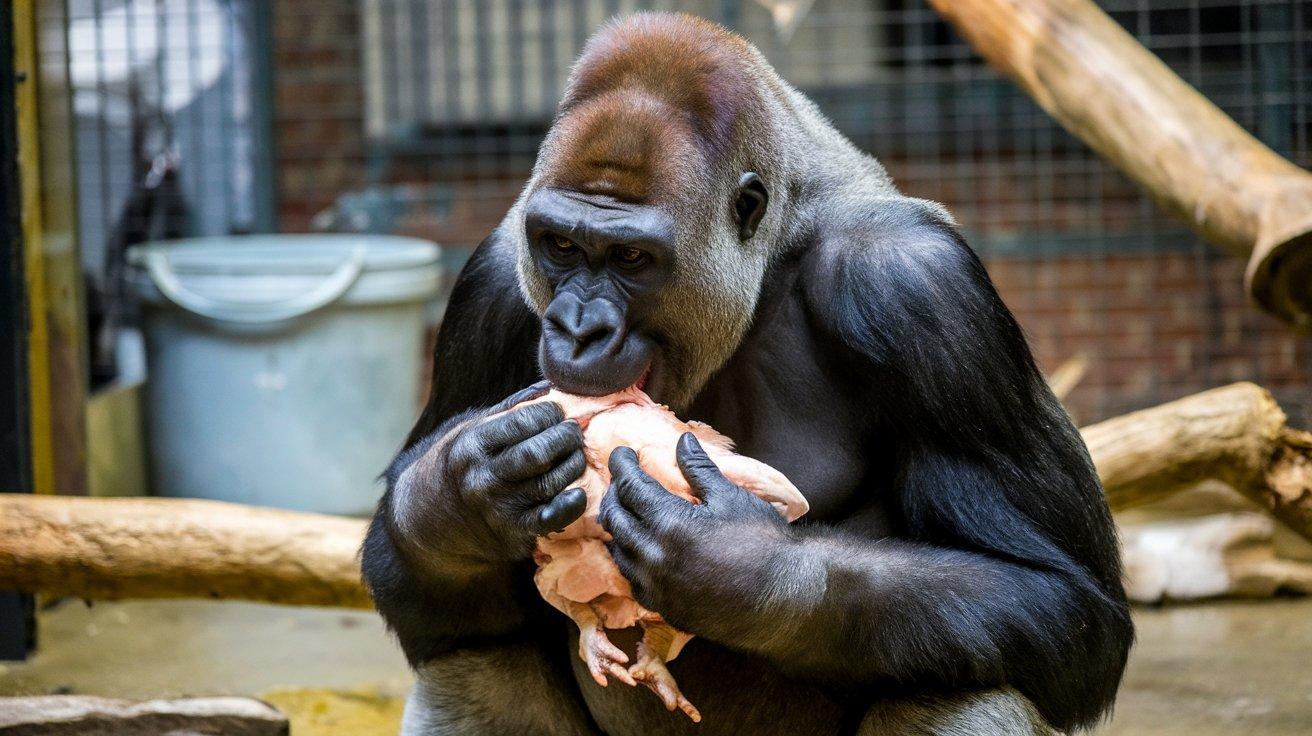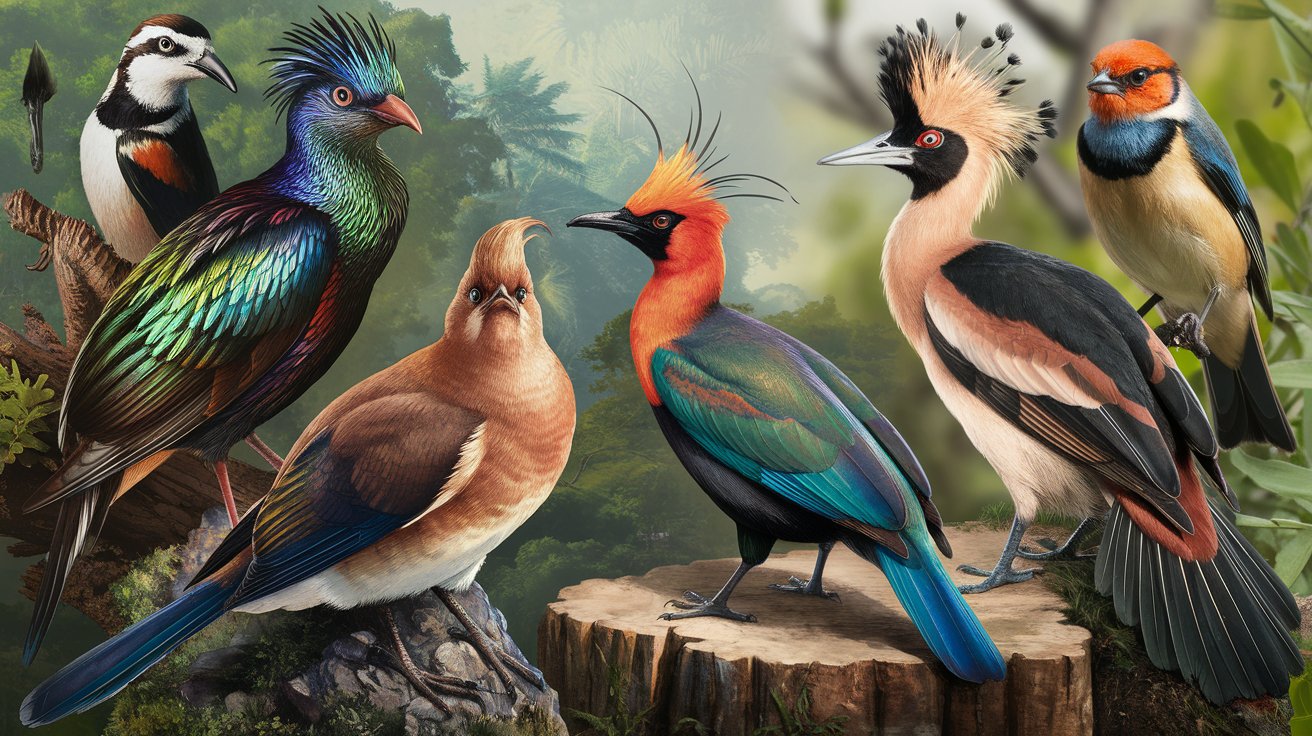Do Gorillas Eat Meat? Gorillas are fascinating creatures that captivate us with their strength, intelligence, and social behaviors. One of the most common questions about these gentle giants is whether they eat meat. While gorillas are primarily herbivores, their diet is more complex than it seems. This article explores what gorillas eat, how their digestive system works, and whether meat consumption is part of their natural behavior.
Understanding Gorilla Diets
Gorillas are large primates that belong to the genus Gorilla. There are two main species: the Eastern Gorilla and the Western Gorilla, each with two subspecies. Despite differences in habitat and food availability, all gorillas share similar dietary patterns.
Primary Diet: Herbivory
Gorillas are classified as herbivores, meaning the majority of their diet consists of plant material. Depending on their environment, they consume a mix of:
- Leaves: The primary food source, especially for mountain gorillas.
- Fruits: A staple for lowland gorillas, which have more access to fruit-bearing plants.
- Stems and Shoots: Bamboo and other plant shoots are rich in nutrients.
- Bark and Roots: These provide additional fiber and minerals.
Gorillas spend a significant portion of their day eating. Their large size and high energy demands require them to consume between 40–60 pounds of food daily.
Do Gorillas Eat Meat?
While gorillas are predominantly plant-eaters, they are technically omnivorous, which means they occasionally consume animal matter. Here’s how meat fits into their diet:
Insect Consumption
The most common form of “meat” in a gorilla’s diet comes from insects:
- Termites and ants are rich in protein and are often consumed by gorillas. They use tools, such as sticks, to extract termites from mounds.
- Insects contribute a small but significant portion of their protein intake.
Small Animals
There are rare cases of gorillas consuming small animals, but this behavior is not typical. It is usually opportunistic rather than predatory. Unlike chimpanzees, which are known to hunt small mammals, gorillas do not actively hunt for meat.
Why Don’t Gorillas Rely on Meat?
Gorillas’ diets are largely dictated by their anatomy and environment:
- Specialized Digestive System
- Gorillas have large, chambered stomachs and long intestines designed to break down fibrous plant material, such as cellulose.
- Their gut bacteria help ferment plant matter, providing essential nutrients and energy.
- This digestive setup is less suited for processing large quantities of meat.
- Abundant Plant Resources
- The habitats of gorillas, especially rainforests, provide ample plant-based food year-round. With no need to hunt for sustenance, gorillas rely on the readily available vegetation.
- Low Energy Expenditure
- Unlike carnivores or omnivores that actively hunt, gorillas conserve energy by foraging. Their relatively slow-paced lifestyle minimizes the need for high-calorie, meat-based diets.
Nutritional Breakdown of a Gorilla’s Diet
A gorilla’s diet is rich in the following:
- Fiber: Found in leaves, stems, and bark, fiber aids digestion and provides bulk.
- Sugars: Found in fruits, sugar provides quick energy.
- Proteins: While plant-based, proteins are supplemented by insects and bacteria from fermentation in their gut.
- Vitamins and Minerals: Plants supply essential nutrients like Vitamin C, magnesium, and potassium.
Comparison with Other Primates
Gorillas are unique in their dietary preferences compared to other great apes:
- Chimpanzees: Known for hunting small animals, chimpanzees rely more on meat as a protein source.
- Orangutans: These apes primarily consume fruit but occasionally eat insects and eggs.
- Humans: Our omnivorous diet is highly varied, including meat as a staple.
How Meat Consumption Affects Gorilla Behavior
Although rare, the occasional consumption of animal matter has minimal impact on a gorilla’s social and ecological behaviors:
- Tool Use: Using sticks to extract termites demonstrates intelligence and adaptability.
- Social Learning: Young gorillas often learn these behaviors by observing adults.
- Ecosystem Role: Gorillas primarily act as seed dispersers and herbivores, making them crucial for maintaining forest ecosystems.
Myths About Gorillas and Meat
There are several misconceptions about gorillas and their dietary habits:
- Myth: Gorillas hunt and eat large animals.
Fact: Gorillas do not hunt or consume large prey. Their diet is overwhelmingly plant-based, with only occasional insect consumption. - Myth: Gorillas are carnivores because of their size and strength.
Fact: Their size is supported by the large quantities of plant matter they consume daily, not meat.
Conservation Implications
Understanding gorillas’ diets is essential for their conservation:
- Habitat Protection: Conserving forests ensures access to their primary food sources.
- Education and Awareness: Dispelling myths about gorillas can help promote their protection.
- Research: Studying their diets provides insights into their health, behavior, and ecological roles.
Frequently Asked Questions (FAQs)
- Do gorillas ever eat meat?
Yes, but only occasionally, in the form of insects or very rarely small animals. - What do gorillas eat most of the time?
Gorillas primarily eat leaves, fruits, stems, and other plant-based foods. - Are gorillas vegetarian?
While they are mostly herbivores, they are technically omnivorous because they consume insects. - Why don’t gorillas hunt?
Gorillas have evolved to rely on abundant plant material in their habitats, making hunting unnecessary. - How much food does a gorilla eat daily?
Gorillas eat around 40–60 pounds of food each day, depending on their size and activity levels. - Is meat necessary for a gorilla’s diet?
No, their nutritional needs are met through plants, with insects providing additional protein.
Conclusion
While gorillas are primarily herbivores, their diet occasionally includes animal matter, particularly insects. These gentle giants rely on their plant-based diet for survival and have evolved unique digestive systems to process fibrous vegetation. Understanding their dietary habits not only deepens our appreciation of these incredible animals but also highlights the importance of conserving their natural habitats. By protecting gorillas, we also preserve the ecosystems they help sustain.





